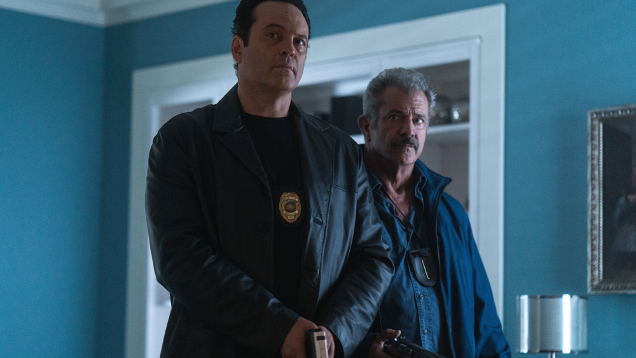Early look review: Dragged Across Concrete is an art film disguised as a B movie

Having attended a very early screening of the upcoming crime film Dragged Across Concrete (which arrives in cinemas next year), critic Luke Buckmaster explains how this peculiar movie counters expectations.
By casting Mel Gibson in his new film Dragged Across Concrete, writer/director Craig S. Zahler is up to his old tricks: luring audiences with the promise of exploitation, then delivering them slow-burning drama. A singular and idiosyncratic voice in American cinema, Zahler – whose previous features are the grisly neo-western Bone Tomahawk and the superb, Kafkaesque prison drama Brawl in Cell Block 99 – practises a kind of reverse bait-and-switch, with seemingly low-rent grindhouse-y productions turning out to be intensely serious works.
Part of the filmmaker’s juggling act – balancing ‘real’ art with sating desire for schlocky spectacle – involves literalisation. In Bone Tomahawk there really was a bone tomahawk, constructed using human body parts and wielded by a tribe of cannibals. In Brawl in Cell Block 99 there really was a brawl in cell block 99, though “brawl” could just as well be substituted for “bloodbath,” with Vince Vaughn’s protagonist penetrating various circles of hell on earth.
These films do what they’ll say they’ll do on the can, but are far from trash-humping midnight movies. Violent, yes, but gratuitous? I dare say they are not. The first violent confrontation in Cell Block 99 arrives over an hour in, and the extreme wince-inducing stuff closer to two. Dragged Across Concrete has even less bloodshed than Zahler’s fans might expect. It is a long (159 minutes), casually paced and idiosyncratic cop movie light on action – with a lot more concrete than dragging. The casting of Gibson exacerbates a sense of wrongness; a feeling this is a movie we shouldn’t be watching.
Ridgeman (Gibson) is a veteran cop who, struggling to care for his teenage daughter and wife with MS, believes he has been shorthanded by the system. He envisions a plan to steal money from bank robbers, convincing his partner Lurasetti (Vaughn) to join him. The plan involves monitoring get away driver Henry (Tory Kittles), who has his own (not necessarily nefarious) reasons for being involved. All the key players are up against it in various ways.

Zahler is very good at evoking a festering sense of dissatisfaction shared on both sides of the law. Like Hell or High Water and the video game Red Dead Redemption 2, Dragged Across Concrete tosses around the idea that something great about the American experience has been lost, though it is vague about exactly what that is and even vaguer on how it might be returned. One wonders whether the auteur either wrote certain lines for Gibson, or whether Gibson was drawn to them. At one point the actor grumbles: “I don’t politick and I don’t change with the times.”
Characters who appear to be bit players become primary forces in the narrative, and others who seem positioned to play a part in steering the story disappear for large chunks or never return. The tone and even the world of the film is not dissimilar to Michael Mann’s operatic crime drama Heat, with its a concrete playground of plotting men and clashing motives, the director cutting up business-like conversations with methodically paced action and heist scenes. The performances in Dragged Across Concrete have gratitas and Benji Bakshi’s cinematography is steely and measured, though far from the thrilling compositions of Brawl in Cell Block 99 (which he also shot).
Zahler is a director who treats his audience with respect; possibly more than they reciprocate. At the Australian premiere of Dragged Across Concrete, which was part of this year’s MonsterFest, the crowd initially behaved in an annoying way that liquored-up audiences are sometimes wont to do, laughing and chortling and hee-hawing in an attempt to turn a serious film into a pulpy comedy, as if they could transform it by sheer force of will. The weight and credibility of Dragged Across Concrete ultimately silenced them. If they came for exploitation, they ended up sitting through an opus.

















